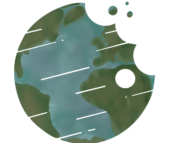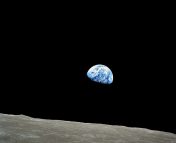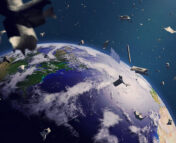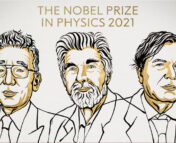Dear Readers,
We are so excited to announce a new effort: The Astrobites Climate Change Series! A recent post on reconciling a career in astrophysics with eco-anxiety and an earlier post on how to reduce the carbon footprint in astronomy started a larger dialogue within Astrobites as well as the broader community. The incredible response to this article from students, post-doctoral fellows, and professors shows how deeply the climate crisis is affecting us, even though our science goes beyond our Earth. We are humans first and scientists second. However, as scientists, we have the ability and responsibility to educate and effect change—here at Astrobites, we are taking the initiative to use this platform to expand on this conversation. In this Astrobite, we outline our goals, plans for posts, exciting collaborations, and new events!
Astrobites is for astrophysics research. Why dedicate a whole section to the environment?
The more we study the cosmos, the more we realize how precious and rare Earth is. This unique perspective allows us to speak on how important it is we preserve the only planet we have, and will ever, call home. Because of the very nature of astronomy—a field that intrigues people of all ages all over the world—we can educate on a global level.
As a platform focused on science communication, we feel it is important to not only embrace interdisciplinary science, but also continue to discuss the climate emergency that will leave no one unaffected.
What good is astronomy research without the Earth to literally and metaphorically ground our studies of the Universe?
It is becoming increasingly clear that climate change is permeating all aspects of our society, scientific and otherwise. Changing atmospheric conditions can impact weather and ground-based telescopes, and droughts and wildfires endanger both lives and infrastructure (e.g. observatories, universities). Our carbon footprint is shaped not just by industrial emissions, but also by high-performance computing clusters and in-person academic conferences. Like it or not, astronomy has contributed to global warming and is already feeling its effects.
Focusing solely on astrophysical research is doing a disservice to our world. We must acknowledge and confront our impact on the climate, take responsibility, and act quickly to mitigate our emissions, not just because of its impact on our research, but because of this threat to all of humanity. We cannot afford to ignore how the two are intertwined.
Goals for this series:
We plan to regularly (at least monthly) post about astronomy and climate change to educate members of our field and the larger community on topics such as:
- Virtual conferences and their effects on emissions,
- Satellites and space debris,
- Bringing climate change into introductory courses spanning all subjects,
- Reviews of the Nature Astronomy series on climate change,
- Best practices for conversations about climate change with the general public,
- Interviews of people who have moved from astrophysics and related fields to climate science or environmental studies,
- Renewable power in astronomy,
- Press coverage of sustainability-focused sessions at conferences around the globe,
and much, much more!
Collaborations:
We are currently collaborating with
- Astronomers for Planet Earth (A4E) — please check out their open letter and sign in support; and
- Other sister Sci-bites groups — addressing climate change is inherently an interdisciplinary undertaking, and we are excited to write joint posts with our friends who specialize in environmental science, chemistry, geoscience, oceanography, etc.
We are also looking to partner with climate-focused research centers as well as policy organizations!
Earth Week x Astrobites coming to you April 2022…
We are excited to announce that starting next year, we will be planning a special Earth Week x Astrobites event full of new research-intensive posts consisting of large-scale studies our authors are currently performing and community events planned with our partners! Next year Earth Week is from April 18 to April 24, 2022, and Earth Day falls on April 22, 2022. Mark your calendars! More information to come as April approaches. In the meantime, look out for our monthly climate-related posts.
We also want to hear from you!
Part of the reason we decided to move forward with dedicating a section on our website to climate change was because of our readers’ response to and interest in our posts addressing climate change. We want to know what topics you would like to see on our site, people you think will be great interviewees (i.e. someone who switched fields from astro+ to environment/climate studies), whether you are interested in a collaboration with us, and if you would like press coverage for one of your environment-related events!
Please submit and comment your ideas through the Google form here. Feel free to comment directly on this post as well.
We are so excited to see what comes out of this and are eager to hear your thoughts. This is, after all, our Earth.
Yours, from our home planet,
Astrobites
Astrobite edited by Olivia R. Cooper, H Perry Hatchfield, Graham Doskoch, Ellis Avallone, and Jenny Calahan
Featured image credit: Suchitra Narayanan
Disclaimer: This article was written and edited by a group of Astrobites authors. It is not intended to be representative of the views of the AAS (which supports Astrobites) or all astronomers.





This series sounds great! I’d be very interested to hear from people who switched from astrophysics to a career in climate / environmental science, as I’m a 2nd year PhD student who’s debating doing the same post-PhD, so I’d love to hear how they transitioned across, and any tips they have for doing the same.